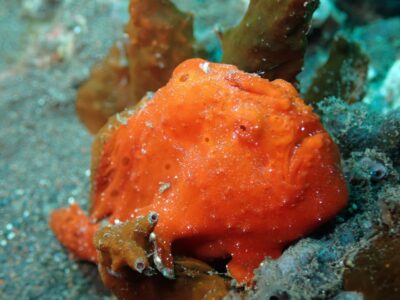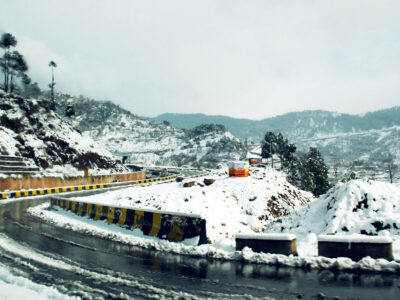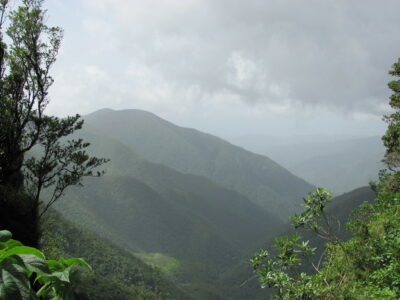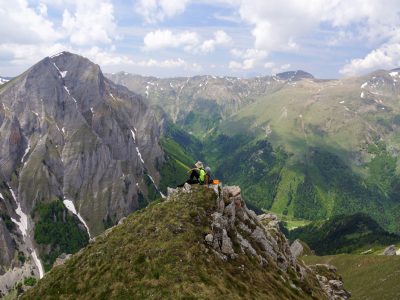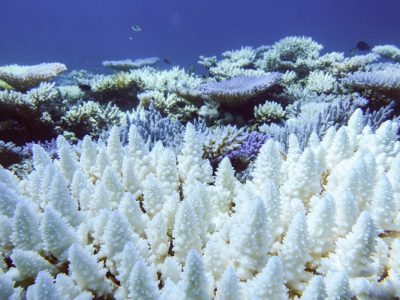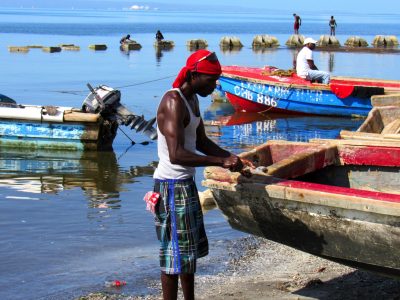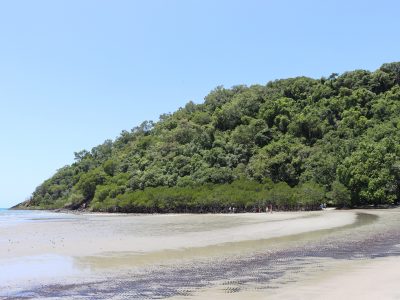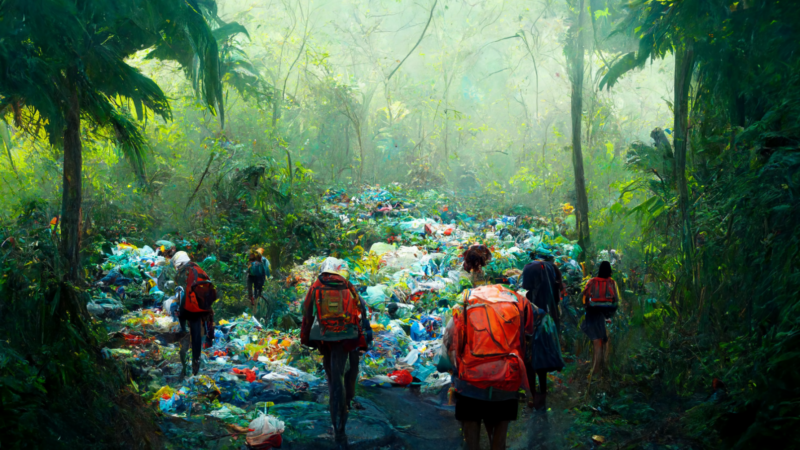
Image courtesy of Sydney Allen
About eight percent of the world's annual CO2 emissions are related to the global tourism industry — primarily through airfare and transport pollution. And these emissions don't show any sign of slowing down. Transport-related carbon dioxide emissions from tourism grew at least 60 percent between 2005–2016 and are projected to increase by around 25 percent between 2016–2030 without urgent decarbonization efforts, according to the UN World Tourism Organization.
While this figure is certainly alarming, the indirect effects of this industry can be even more insidious — especially for the local communities directly affected. Coastal development for tourist-related facilities erodes important coastal barriers and kills coral reefs and marine ecosystems. Millions of acres of land have been taken from Indigenous populations for tourism development — often for projects that alter and damage the land beyond repair. Increased traffic, pollution, waste, and water usage for tourism activities can strain local infrastructure. Not to mention, countless local communities are forced from their neighborhoods as gentrification and rising prices make life unaffordable.
Last November, environmentalists, politicians, activists, and economic stakeholders from around the world met in Glasgow for the 26th annual United Nations Climate Change Conference (COP26). A novel addition to the conference was the inclusion of the Glasgow Declaration on Climate Action in Tourism, an initiative to “declare our shared commitment to unite all stakeholders in transforming tourism to deliver effective climate action.”
The declaration pushes for a transition to tourism with an environmentally conscious foundation, from the consideration of carbon emissions to the promotion of community wellbeing, particularly in developing nations. It calls on all areas of the tourism sector, such as the airline and hotel industries, to participate in more transparent, regenerative, and climate-conscious practices. The declaration describes five core values for achieving these goals, including the measuring and disclosure of all tourism-related emissions, setting decarbonization goals, restoring ecosystems, and increasing collaborative efforts between stakeholders. In many countries, the response to these issues is travel in the form of ecotourism.
Ecotourism, at its core, aims to promote “responsible travel” that simultaneously aids in the conservation and protection of the ecological, social, and cultural aspects of a destination. However, this does not mean that all ecotourism is sustainable or accessible.
For many, ecotourism can also feel like an exclusionary and purely symbolic venture available for primarily privileged Westerners with robust pocketbooks. This is a widespread sentiment in ecotourism hotspots such as Bali, where despite a carefully cultivated image of an island with sustainable hospitality practices, tourists use, on average, 3.5 times the amount of plastic as locals, and 70 percent of the money made from tourism is sent abroad, according to estimates by the Bali Tourism Board.
In Jamaica, the proposed construction of a luxury coastal hotel with a self-proclaimed “commitment to sustainability and environmental awareness” garnered public outrage after videos were shared of a mangrove forest being bulldozed to make way for the hotel.
Similarly, as “off-the-grid” travel and adventure sports increase in popularity, many remote places are dealing with more tourists than ever before. Aside from the obvious environmental impacts of this — increased tourists mean more waste and more disruption to pristine ecosystems — this also has led to safety concerns as novice and inexperienced adventurers enter environments they are unprepared to navigate.
This is most visible within the mountaineering tourism industry, as increased participation has led to long waits and crowding at crucial, dangerous intersections; increased trash and waste; deadly falls, accidents, hypothermia, and altitude sickness; and more search and rescue operations, which are often risky for the medical and park staff.
On the other hand, ecotourism also has the potential to greatly improve the economic and environmental condition of a location. This is seen in Nicaragua, where ecotourism guides assert that tourists are needed to save natural reserves from encroachments. With their tourism industry taking hits from political unrest in 2017, followed by the COVID-19 pandemic, the number of international tourist arrivals declined from almost 2 million visitors in 2017 to around 470,000 visitors in 2020.
According to Marcelo, a tour guide for the Isla Juan Venado Nature Reserve, without an influx of tourism to sustain the upkeep of the reserve, locals had to resort to other means of sustaining themselves, such as chopping firewood or hunting iguanas and crocodiles for food and leather that can be sold. Previously, many worked in the tourism and service industry. In this way, ecotourism can be proven to be a juncture by which to encourage locals as well as tourists to protect their land.
Similarly, island nations that served as attractive destinations for their ecological wonders saw a massive decline in tourism due to the COVID-19 pandemic — for many of these countries, tourism is the primary source of income. However, this also reveals the flawed nature of tourism in many countries — without other economic ventures, locals are often forced to economize their traditional and spiritual connection to the land for the entertainment and pleasure of tourists. In many ways, the manner in which ecologically vital sites are marketed and exotified for foreign consumption can be considered to be a form of modern-day colonialism.
Global Voices intends to use this special coverage series as a lens by which to examine the environmental impact of tourism, the nuances and challenges of the emerging eco-tourism industry, and its environmental and cultural implications.
Stories about Ecotourism
Australia's unique natural wonders are at risk from ecotourism expansion
"These islands attract millions of visitors a year keen to experience their natural wonders. Yet often this very “ecotourism” is contributing to their degradation."
Can environmental conservation and tourism exist together harmoniously?
"Ecotourism is an illustration of the wider phenomenon facing climate action: the interests of economic development are all too often diametrically opposed to the interests of environmentalism."
Peer under the sea of the Indonesian archipelago through this photo essay
Many of the creatures featured in this piece, as well as our coastal economies, are under threat as the climate crisis warms ocean waters and threatens coastal ecosystems
Citizens push back on Palau’s plan to open marine sanctuary to commercial fishing and exploration
"...We believe there is a multitude of unexplored alternatives resulting in sustainable revenues that return social and environmental gains."
Mass coral bleaching of Australia's Great Barrier Reef goes under the media radar
This week Will Smith got more media coverage for bad behaviour than the ongoing decline of the world’s coral reefs.
Why Beijing’s artificial snow at the 2022 Winter Olympic Games is stirring controversy
The Winter Olympic Games start in Beijing, on February 4: For the first time, all of the snow at the Games will be entirely man-made.
Passengers stranded at Istanbul Airport stage a protest
Videos of passengers demanding accommodation made rounds on Twitter after thousands of travellers were stranded at the new Istanbul airport as a result of bad weather conditions and cancelled flights.
Heavy snowfall kills tourists at a hill station in Pakistan
At least 23 people, including women and children have died in cars that were stranded due to heavy snowfall in the Murree hill station area near the capital of Pakistan.
In photos: Could the mountains of the Caribbean be an opportunity for sustainable tourism?
"Sustainable tourism in mountains can contribute to creating additional and alternative livelihood options and promoting poverty alleviation, social inclusion, as well as landscape and biodiversity conservation."
Take a hike! Some of the Caribbean's most scenic trails in photos
Many Caribbean people are avid hikers—these photos will show you why.
An all-women coral conservation team is helping to revive Indonesia's world-famous Gili reefs
"I believe that empowering women and promoting gender equality is crucial to accelerating sustainable development."
Philippines will allow casinos on world-famous Boracay Island, despite local opposition
“I appeal to our leaders in the province not to allow gambling casino that will destroy our cherished land.”
Australia's iconic Kosciuszko National Park faces threats on two fronts
"...commercial interests will be dictating developments within the park with scant attention to nature conservation, landscape, and heritage values for which the park was dedicated."
In the face of elite tourism projects, the Barbuda Warbler isn't the only one that might lose its home
After 2017's Hurricane Irma, Barbudans were made to evacuate the island. Little did they know this would coincide with the washing away of their centuries-old communal land rights.
Volunteers tackle Bali’s plastic problem during pandemic
On average in Bali, per capita, a tourist uses 3.5 times more plastic per day than a local resident.
North Macedonia creates a new national park occupying 2% of its territory
Activists warn, however, that declaring the Shar Mountains a national park will not stop the construction of seven small hydro power plants that are already devastating the area's natural environment.
UNESCO proposes listing World Heritage Great Barrier Reef as ‘in danger’
The fairness of the diplomatic process are irrelevant to the wider context of the reef’s 'in danger' listing. Australia risks being labelled an international climate change pariah.
World Oceans Day: The Caribbean Sea faces dual threat of climate change and overfishing
It is clear the Caribbean is on the frontline of climate change, and its creeping impact on the marine environment is showing itself in various ways.
How long can Australia protect its diverse rainforests and unique wildlife?
Despite numerous public campaigns and government programs, native forests in Australia, from the hot far north tropics to the cooler temperate south, face a variety of threats.
Three climbers go missing during winter attempt to scale K2 summit in Pakistan
Though chances of their survival are slim, the families of three missing mountaineers have been hoping for a miracle.
New height of Mount Everest announced just as Nepal reopens its tourism sector
The world's highest mountain has grown by 86 centimeters, according to a survey carried out jointly by Nepal and China.



